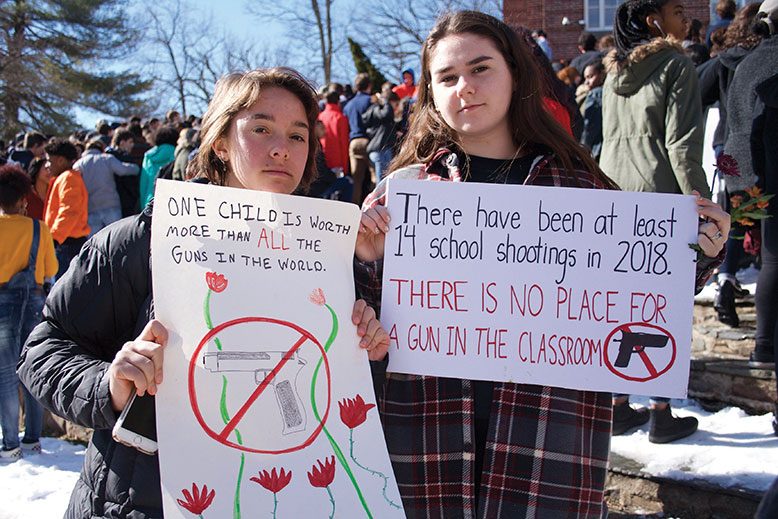
In mid-March, students from thousands of schools across the nation walked out of their classes to participate in organized demonstrations for more sensible gun laws. Whatever you might think of their actions, there’s no denying the walkout reawakened questions about student activism and free speech.
Certainly, our schools want to teach kids to be engaged citizens, but as we enter what seems to be a new era of student activism, how much engagement are schools required to allow—and how much should they allow?
“All schools should encourage civic participation and direct lessons in democracy by allowing students to engage in critical social issues,” says Amol Sinha, executive director of the ACLU of New Jersey. “And all schools must allow students to express themselves as long as it’s not lewd and doesn’t disrupt school operations, and they can’t punish students more severely for political actions than for parallel actions that are not political.”
Some students, like Caitlyn Park, who helped organize the student walkout at Watchung Hills Regional High School in Warren, were clear on what they hoped to express. In an interview with MyCentralJersey.com after the walkout, the 18-year-old senior said, “I ardently believe in the power of the people and the power of peaceful protest. Moreover, an individual’s right to articulate their political perspective is something not restricted by age.”
For other, younger students, the purpose of the walkout may not have been as well-defined. My own 13-year-old, Chris, was concerned that he might “get in trouble” if he participated. I asked him if he knew what the protest was about. He responded, “It’s about guns, right?” (We then had a substantive discussion about gun control.) Like any parent, I wondered how many children participated in the walkout because their friends were or because they were looking to get out of class.
Individual school districts can and do exhibit different levels of tolerance. In Sayreville and South Plainfield, the districts punished those who walked out with one- or two-day suspensions, citing student safety as the reason for the strict policy. “I believe that protecting our students is the most important issue that needs to be addressed,”said South Plainfield superintendent Noreen Lishak at a board of education meeting after the March walkout.
Still, there was some good news for students who participated in the walk out without their school’s blessing. More than 200 institutions of higher education, including Princeton University, Rutgers and the College of New Jersey, informed prospective students that consequences resulting from the walkout won’t affect admissions decisions.
Educators such as Marie Blistan, president of the NJ Education Association and a teacher in Washington Township, remind us that the purpose of education isn’t just to learn facts, but to learn to be a thoughtful, engaged member of society. “As a teacher,” says Blistan, “it thrills me when students begin to recognize that they have a voice and that they can use their voice to speak up for what they believe in. Educators recognize those moments for the learning opportunities that they are.”
Where do we go from here? Other issues are sure to arise. How much activism can schools tolerate?
“The Constitution has drawn some of the lines for us,” says the ACLU’s Sinha. “Although the concerns of students and the concerns of administrators might run up against each other, there are fundamental principles that remain constant. Schools are allowed to observe reasonable restrictions on disruptive or profane speech—but what they can’t do is invent justifications to punish students unreasonably for exercising their rights.”
Yes, student activism raises complicated questions, but I believe it is one of the most positive developments on the political landscape in a long time.
